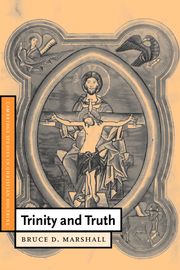Book contents
- Frontmatter
- Contents
- Preface
- A note on translations
- 1 Introduction: theology and truth
- 2 The triune God as the center of Christian belief
- 3 Epistemic justification in modern theology
- 4 Problems about justification
- 5 The epistemic primacy of belief in the Trinity
- 6 Epistemic priorities and alien claims
- 7 The epistemic role of the Spirit
- 8 The concept of truth
- 9 Trinity, truth, and belief
- Index
9 - Trinity, truth, and belief
Published online by Cambridge University Press: 23 December 2009
- Frontmatter
- Contents
- Preface
- A note on translations
- 1 Introduction: theology and truth
- 2 The triune God as the center of Christian belief
- 3 Epistemic justification in modern theology
- 4 Problems about justification
- 5 The epistemic primacy of belief in the Trinity
- 6 Epistemic priorities and alien claims
- 7 The epistemic role of the Spirit
- 8 The concept of truth
- 9 Trinity, truth, and belief
- Index
Summary
Truth under theological discipline
Truth borne by a person
In a theological account of truth, as Donald MacKinnon suggests, any understanding we may acquire of that notion without reference to Christian beliefs will no doubt be “radically disciplined and changed,” although – we hope – “not annihilated.” The New Testament seems to regard “is the truth” as a genuine predicate both of Jesus Christ (see Jn. 14:6) and of the Holy Spirit (see I Jn. 5:6). The discipline to which theology subjects any philosophical proposal about truth is thus obvious, and radical: if Jesus Christ is the truth, then truth is borne, not only or chiefly by sentences and beliefs, but by a person. More than that: if the New Testament is right, then in the end truth is a person. The same applies, though differently, to the person of the Spirit.
Should the Tarski–Davidson notion of truth outlined in the previous chapter prove incompatible with the claim that truth is each of these persons, and so intractable to theological discipline, it faces annihilation (to use MacKinnon's term). At first glance, though, it might seem that a Tarski–Davidson account of truth states the truth conditions, and so displays the workings of “is true,” for statements which express central Christian beliefs as well as it does for any other statements. Surely Christians want to say, for example, that the following sentence is true:
“Jesus is risen” is true if and only if Jesus is risen.
Jesus is risen, so Christians proclaim; therefore “Jesus is risen” is true.
- Type
- Chapter
- Information
- Trinity and Truth , pp. 242 - 282Publisher: Cambridge University PressPrint publication year: 1999



